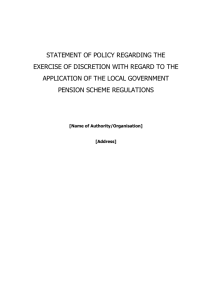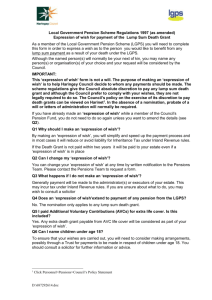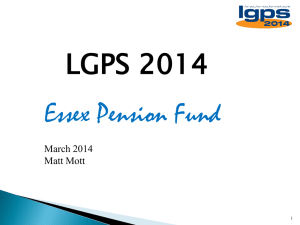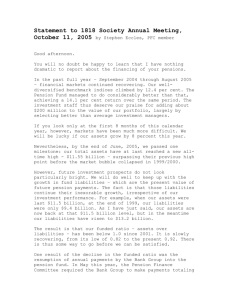TO BE RETAINED BY EMPLOYER
advertisement
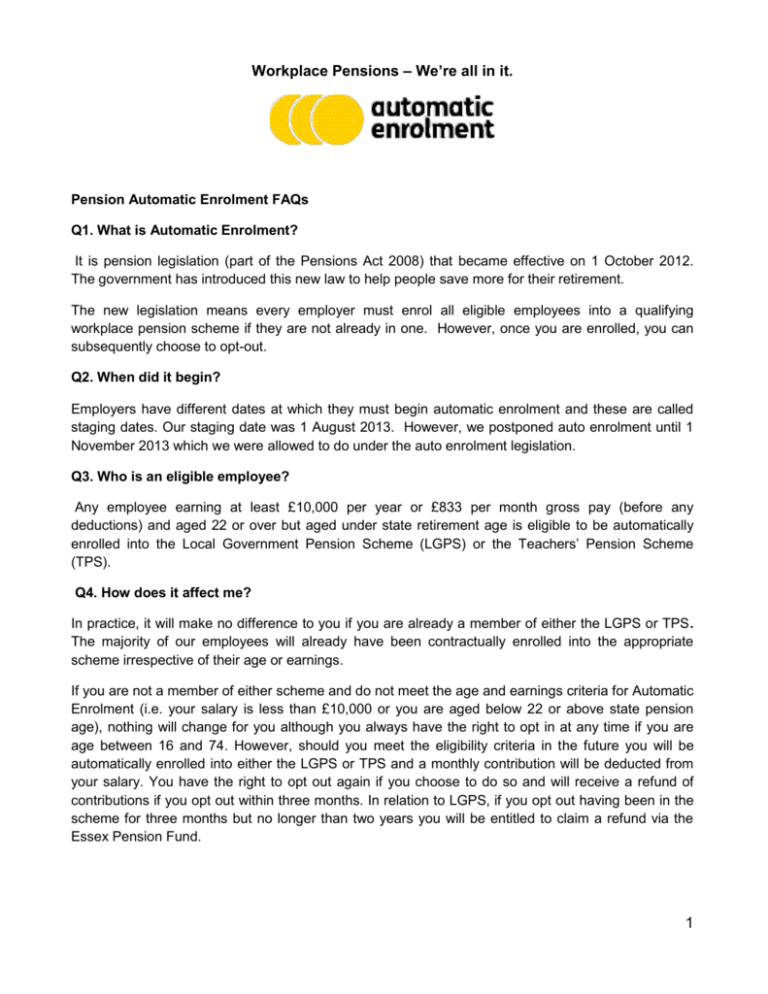
Workplace Pensions – We’re all in it. Pension Automatic Enrolment FAQs Q1. What is Automatic Enrolment? It is pension legislation (part of the Pensions Act 2008) that became effective on 1 October 2012. The government has introduced this new law to help people save more for their retirement. The new legislation means every employer must enrol all eligible employees into a qualifying workplace pension scheme if they are not already in one. However, once you are enrolled, you can subsequently choose to opt-out. Q2. When did it begin? Employers have different dates at which they must begin automatic enrolment and these are called staging dates. Our staging date was 1 August 2013. However, we postponed auto enrolment until 1 November 2013 which we were allowed to do under the auto enrolment legislation. Q3. Who is an eligible employee? Any employee earning at least £10,000 per year or £833 per month gross pay (before any deductions) and aged 22 or over but aged under state retirement age is eligible to be automatically enrolled into the Local Government Pension Scheme (LGPS) or the Teachers’ Pension Scheme (TPS). Q4. How does it affect me? In practice, it will make no difference to you if you are already a member of either the LGPS or TPS. The majority of our employees will already have been contractually enrolled into the appropriate scheme irrespective of their age or earnings. If you are not a member of either scheme and do not meet the age and earnings criteria for Automatic Enrolment (i.e. your salary is less than £10,000 or you are aged below 22 or above state pension age), nothing will change for you although you always have the right to opt in at any time if you are age between 16 and 74. However, should you meet the eligibility criteria in the future you will be automatically enrolled into either the LGPS or TPS and a monthly contribution will be deducted from your salary. You have the right to opt out again if you choose to do so and will receive a refund of contributions if you opt out within three months. In relation to LGPS, if you opt out having been in the scheme for three months but no longer than two years you will be entitled to claim a refund via the Essex Pension Fund. 1 Q5. Are the Local Government Pension Scheme (LGPS) and the Teachers’ Pension Scheme (TPS) qualifying schemes? Yes they are. They have been classed as ‘super compliant’ which means they exceed the Government’s new standards for qualifying workplace pension schemes. Q6. Why should I be a member of a qualifying workplace pension scheme and what’s in it for me? State pension (currently £110.15 per week for a single person) is unlikely to provide you with enough income when you retire. The good news is that, if you become a member of the LGPS or the TPS, each time you are paid, both you and Anglia Ruskin will pay money into the scheme to provide you with benefits when you retire. If you are a taxpayer, the government would also be contributing to your pension through tax relief and, if you pay National Insurance (NI), you would pay a lower rate of NI. So you will not be the only one saving for your future. A basic rate tax payer paying pension contributions of £100 a month will pay about £20 less tax and their NI reduces too. The LGPS and the TPS offer one of the best ways to plan for retirement with an excellent range of defined benefits. Unlike some schemes your pension is not affected by share prices and stock market fluctuations. Q7. What contributions will I have to make to the Local Government Pension Scheme? For the LGPS your contribution rate will be between 5.5% and 12.5% of your pensionable pay. From April 2014 your contribution rate will be determined by your actual pensionable pay rather than the full time equivalent if you are part time. The new contribution bands take tax relief and level of income into account and are more progressive, this means that contributions increase with earnings. LGPS Contribution Table for 2014/15. Pay Band Employee contribution rate Up to £13,500 £13,501 - £21,000 £21,001 - £34,000 £34,001 - £43,000 £43,001 - £60,000 £60,001 - £85,000 £85,001 - £100,000 £100,001 - £150,000 More than £150,000 5.5% 5.8% 6.5% 6.8% 8.5% 9.9% 10.5% 11.4% 12.5% LGPS definition of ‘Pensionable Pay’ is the total of: all the salary, wages, fees and other payments paid to an employee for his/her own use in respect of his/her employment; and 2 any other payment or benefit specified in his/her contract of employment as being a pensionable emolument. payments for non-contractual overtime An employee’s pensionable pay does not include: any travelling, subsistence or other allowance paid in respect of expenses incurred in relation to the employment Q8. What contributions will I have to make to the Teachers’ Pension Scheme? Your contribution rate will be between 6.4% and 12.4% of your pensionable pay, depending on what pay band range you fall into - see the table below. TPS - Employee Contribution table for 2014/15: Whole-time equivalent pay rate in the post Up to £14,999 £15,000 - £25,999 £26,000 - £31,999 £32,000 - £39,999 £40,000 - £44,999 £45,000 - £74,999 £75,000 - £99,999 More than £100,000 Employee contribution rate 6.4% 7.2% 8.3% 9.5% 9.9% 11.0% 11.6% 12.4% Your contributions to the TPS will be deducted from the pensionable pay paid to you each pay period. TPS definition of ‘Pensionable Pay’ is:‘Any payment on which a member pays pension contributions.’ This could be your total annual gross salary inclusive of any other pensionable allowances. All members who work full or part time and are earning a salary up to £14,999 will contribute 6.4% of their monthly gross earnings based on their full-time equivalent salary. For example, a teacher could be working just one hour a week on an equivalent gross of any minimum amount up to a max of £14,999 and would contribute 6.4% of their earnings. The contributions are based on the Equivalent Annual Gross whether the employment is part-time, supply, sessional etc. Enrolment in TPS is not dependent on earnings. Members who entered employment which is pensionable under the Scheme on or after January 2007 are automatically members regardless of earnings. 3 Q9. Will I receive more information about automatic enrolment? If you become eligible for automatic enrolment, you will receive a personal letter which will provide you with more information. Q10. What if I do not want to be in the LGPS or TPS? You can opt out, but legally you must be enrolled before you can elect to leave either scheme. TPS - if you opt out within three months of joining the scheme, you will receive a refund of your contributions. If you opt out after three months your contributions will remain in the pension fund until you retire. LGPS – if you opt out within three months of joining the scheme you will be entitled to a refund via the payroll. If you opt out having been in the scheme for three months but no longer than two years you will be entitled to claim a refund via the Essex Pension Fund. Please note that opting out won’t save you as much in take home pay as you may think. In most cases, you will pay more tax and National Insurance if you opt out of the LGPS or the TPS. A basic rate tax payer paying pension contributions of £100 a month will pay £20 more tax and their NI contributions will increase. Depending on your age retirement may seem ‘a life time’ away, but remember you may well need a significant pension when you retire to fund life style choices such as travel, holidays, hobbies etc. and it is unlikely that your state pension will provide enough income to meet the lifestyle you aspire to. Whatever your reasons for considering opting out of the scheme, we ask that you give this matter careful consideration before making a final decision. You may wish to take financial advice before making a decision to opt out. If you are opting out of the LGPS or TPS due to advice you have received you should ask for the advice in writing. Q11. Where can I get an opt out form? For the LGPS the opt out form can be downloaded from www.essexpensionfund.co.uk and should be completed and returned to HR Services. For the TPS an opt out form is available from www.teacherspensions.co.uk. The form can be completed and submitted online or you can print a copy to complete manually and return it to HR Services. Q12. If I opt out, can change my mind and opt back in? Yes, at any time. Please note that your employer must automatically re-enrol you every three years on the anniversary of the staging date (unless you opted out within 12 months of any re-enrolment date). Q13. If I opt out, after I have been automatically enrolled into the LGPS or TPS, can I get my contributions back? Yes, see question10 above. 4 Q14. Is it really worth being in the LGPS or TPS? Yes. It is impossible to buy the same benefits; pension, ill health cover, death in service lump sum etc. - through any other arrangement. Tax relief means that the cost to you of participating is less than the headline contribution rate. Employers generally contribute around twice as much as members do to the scheme and their contribution is only available through participation in the scheme. Given the comparatively low level of state pension provision available, the real question to ask yourself is can you afford not to be in a scheme? Q15. Why should I join because I only work part time? The LGPS & TPS allows you to save while you are working in order to enjoy benefits once you retire. It also offers valuable life cover and family benefits in the event of your death, and cover in the event of your early retirement on the grounds of permanent ill-health, redundancy or business efficiency. If these things are of value to you, it’s worth considering paying in. Q16. Why should I join because I don’t expect to be working in Higher Education for the rest of my career? Many people move jobs frequently. If you do, consider how best to save for your retirement, the LGPS & TPS allows you to save while you’re working, so that you can enjoy benefits once you’ve retired. You also have valuable life cover and family benefits if you were to die while a member. As an LGPS & TPS member, you won’t risk losing past contributions if you move on: on leaving your job, you can choose whether to transfer your pension rights to your new pension provider. Q17. Where can I find more information? The Pensions Regulator – www.thepensionsregulator.gov.uk Department of Work and Pensions – www.dwp.gov.uk The Essex Pension Fund – www.essexpensionfund.co.uk Teachers’ Pension Fund – www.teacherspensions.co.uk If you have a question that cannot be answered from the above information please contact HR Services at askhr@anglia.ac.uk or by calling 0845 196 4788. Updated April 2014 5
